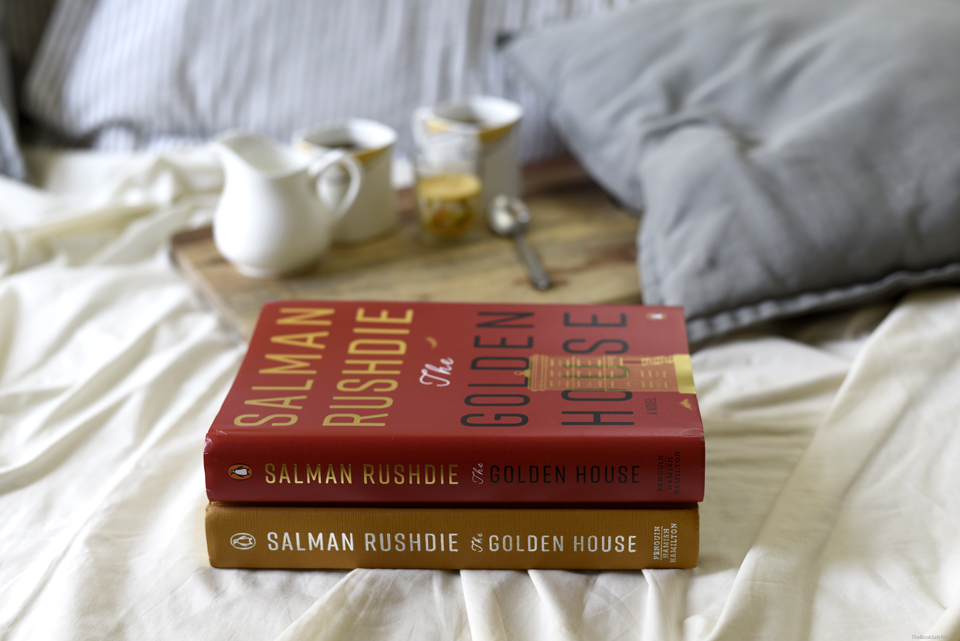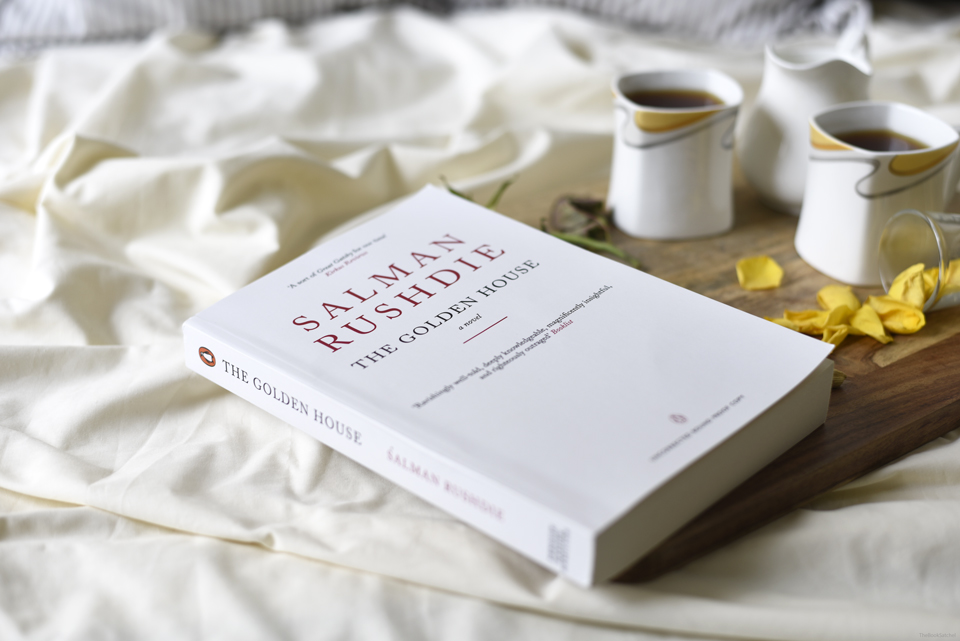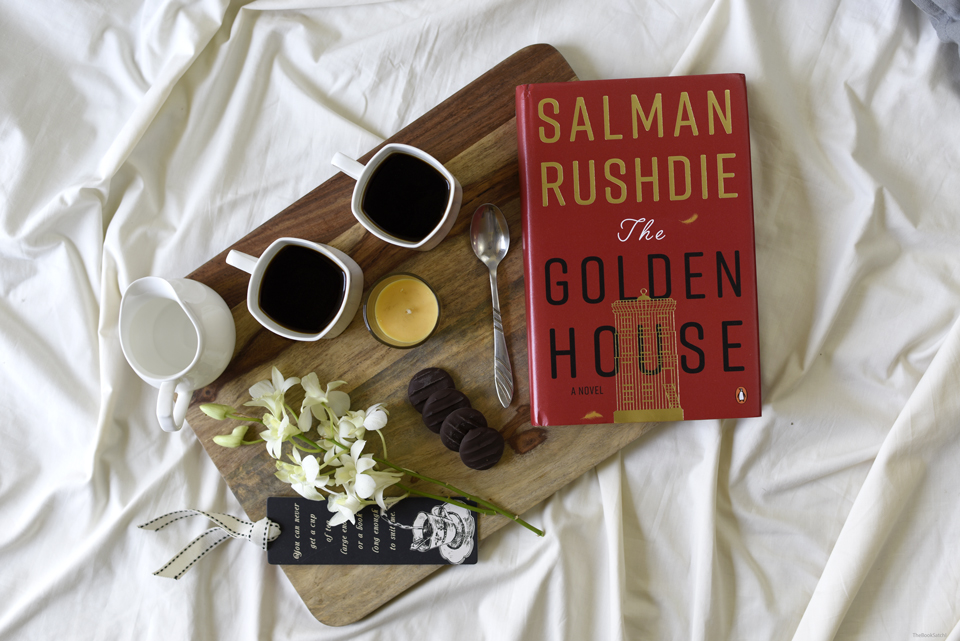Reader. Dreamer. Writer.
The Golden House is the story of a father and three sons who begin a new life in a new country and are running away from the past. This is the latest realistic fiction by Salman Rushdie set in New York and Mumbai.
Dysfunctional family in a dysfunctional country
The Goldens appear like magic. A father and four sons – Immigrants in another country with a mission to reimagine their past and reinvent their future. And they are rich of course! They choose new names for their new life: the father chooses the name Nero, and his sons choose the names Petronius (Petya), Lucius Apulius (Apu), and Dionysius (D). The mansion is renamed The Golden House. It is one among many buildings that open into a common garden; a garden that the elite living in the adjacent buildings are allowed to use.
Rene is a Belgian film maker and a neighbour of the Goldens. Their magical appearance and mysterious past fascinates him and he sees an excellent subject for a film in the Golden family. He observes, interacts and slowly unearths the secrets of the Goldens. In this process, he himself gets entangled in the story.
The character sketches were wonderfully done, be it the mysterious and formidable Nero or the socially awkward but highly intelligent Petya or Apu with his artistic flair; or D with his confused gender identity. The woman in the story, Vasilisa, the new step mom, is scheming, manipulative and feared by the sons to be a ‘gold digger’. All the characters are secretive and closed off but they are exposed as we delve further into the plot.
More interesting is the occasional commentary of American politics like a background hum. Just like the Golden family seems to be falling down like a pack of cards, the political scene in America is on a downhill ride too and is captured in Rushdie’s unapologetic and sarcastic wit.
Bitter truths; Pleasing lies
The whole family is caught in a web of betrayals and all the members (including Rene, an outsider) have things to hide. When the lies erupt, the characters feel weakened and vulnerable. I thought the structure of the novel was interesting; alternating between the main plot and Rene’s script for his movie. There is camera zooming in, a pause and frozen faces in the novel (when it shifts to the script style of writing) which makes the whole book read like a movie. It also keeps the reader wondering where is the line between fiction and reality for the movie based on the Goldens.
A mish mash you might get lost in
The Golden House is written in a way that you might get lost in the passages; and I don’t mean that in a good way. There is an overload of information (in my notes I marked this as ‘info vomit’ but it seemed too crass to write it as such so plainly) that are unnecessary to the storyline. For example, you might read through a tiring list of film makers or read about a list of movies/songs that the character is reminded of or read a long passage about the different sights of a city that you are not familiar with, resulting in making you detached from the narrative.
At times the novel almost felt as if Rushdie is either trying to show off how much information (read TV shows, films, cities, heritage etc) he knows and forced it into the main plot without there being a need for it or trying to forcibly define what ‘fine taste’ entails. So you have it all – Aadhar system, Seinfield, pop culture, Stephen Hawking’s black holes, philosophy, epics, Mumbai underworld – you name it. It isn’t that you feel bored only because you are not familiar with the different things Rushdie throws your way; Murakami for a fact is a writer who often includes songs in his novels and a reader who is not aware of the same will still be able to enjoy his books.

Torturous start
The first 25% of the book was dull and made me question if I actually want to finish the book. But after one fourth of the novel, the pace and style of writing dramatically picked up and I was happy I decided to continue with it. Here is an example of a portion of a passage in Chapter 6.
“No limit to the subjects he reached for and used as punching bags: the British royal family, in particular the sex lives of Princess Margaret, who used a Caribbean island as her private boudoir, and Prince Charles who wanted to be his lover’s tampon; the philosophy of spinza(he liked it); the lyrics of Bob Dylan (he recited the whole of ‘Sad-Eyed Lady of Lowlands’, as reverently as if it were a companion piece to ‘La Belle Damme sans Merci’); the Spassky-Fischer chess match (Fischer had died the year before); Islamic radicalism (he was against it)…” – You get the idea! The paragraph goes on for many more lines. Similar sounding passages dampened my interest in the beginning of the novel.
Thrilling Ending
I loved the second half of the novel that went at a steady pace and then trotted into a thrilling fast read towards the end. Golden’s past was fascinating and wondrous to read about and I almost wished Rushdie had spent more time expanding the Mumbai underworld.

Social Commentary
I loved Rushdie’s sarcasm at the present political conditions as well as his comments on new fads in the society such as actors and movie makers changing the spelling of their names in the hopes of being lucky. He does not shy away from spitting out laughable truths about Donald Trump, referenced as ‘Joker’ in the book. There is significant discussion about gender identity and confusion, the idea of gender, love and gender and so on.
Bitter truths & pleasing lies in a web of betrayals in Rushdie's latest novel Share on X
Final Verdict
I liked the novel and found it enjoyable. But I think it could have been better executed. Had this been written by a less famous writer, it would not create the same impact ; much like how The Ministry of Utmost Happiness would not have done well had it not been written by Arundhati Roy. Just like Rene, I thought the story of the Golden family would make a lovely movie – new money, betrayal, murder, lies, family ties; it has got everything that it needs for a commercial hit. If you pick the book, I warn you that the novel picks up after few initial hiccups; so keep reading.

Title : The Golden House
Author : Salman Rushdie
Publisher : Hamish Hamilton
Publication: 2017
Language : English
Pages : 368
Rating : 3/5
Disclaimer : Much thanks to Penguin India for a copy of the book and to both Flipkart and Penguin India for the ARC. All opinions are my own










I’m afraid that Rushdie is a writer I have never been able to come to terms with. Partly this is because I don’t get on with magic realism but I think in the main it is because I find him so self-conscious as a writer. He always seems to be wanting to draw attention to himself and what you say about information overload makes me think that this would be no different. I suppose we have to accept that there will be some writers who, however feted they may be, will just never be on the same wave length as you and regretfully let them pass by.
I totally understand. I am not a fan of Rushdie either. I read his work because of their literary merit (I have read only three). But I do not enjoy them or feel a sense of awe towards the writer.
I think the aspect of drawing attention towards himself is evident in this book. The beginning is too wordy and Rushdie throws at you different musical pieces, movies, philosophy etc which if you really want to understand you will have to google them out. Moreover these words and phrases do not aid the characters in any way. More like he is trying to say he knows these stuff and you don’t which makes him a class apart. Which is why I specifically put Murakami’s example in the review. I have often not heard of any of the songs Murakami uses in his novels. But I am still at ease and very much invested in the story.
After the first 25% of the book, the novel picks on and I enjoyed the read, surprisingly. So yes, this book might work for some and not work for others.
I’ll be starting this one tonight so have skimmed your review and really only read your summary. I’ll bear your comments about the slow start in mind should I feel myself getting bogged down… and I’ll come back and read your review properly after I’ve finished the book. 🙂
That’s a good plan. I hope you will enjoy the read. I look forward to your review as well.
Here’s a monstrous gap in my reading; I’ve never collected his books although his The Satanic Verses was one of the first books I bought in hardcover, when it was new, as a gift. Not collecting them was probably simply to do with their size initially (with shelf space always limited) but, then, afterwards it became more a question of where/when/whether to start. Periodically I see a nice copy at the library and think “maybe, now?” but something else always takes its place in the stacks. Which of his books would you recommend particularly?
I am the wrong person to ask for a Rushdie recommendation because I am not a fan of his works. I have read only three books, including this one. And often I find myself reading for the literary aspects of his work; not for my enjoyment. However this book was one I enjoyed (perhaps because it is a realistic work of fiction). I would not recommend this as a start because the beginning might scare you. I have been asked to read Haroun and stories by friends who are Rushdie fans. So I will pass on that bit of advice.
I loved Midnight’s Children, but am trying to find a second Rushdie novel to delve into. Am guessing this one is not it.
I like Rushdie (I’m almost a Midnight child myself).
I also like the “Joker” nickname. Suits the Orange man perfectly.
Sounds like I am still in the first quarter of the book as I felt it is going nowhere. The writing is brilliant but at present directionless. Hopefully it will pick up now.
Yes, I felt the same. I was almost going to leave it unfinished. The book picks up later and kind of gets a Godfather like vibe.
I loved Midnight’s Children but I really hated Two Years etc. and this seems like more of the same, without the demons. I think he’s got too clever for his own good and maybe not keen on being edited these days?
I’ve seen so many mixed reviews for this one.
“For example, you might read through a tiring list of film makers or read about a list of movies/songs that the character is reminded of or read a long passage about the different sights of a city that you are not familiar with, resulting in making you detached from the narrative.”
This sounds like it really disrupts the flow of the book… how odd for the author to include things like this.
Despite a painfully slow start, it sounds like the second half of this book was a good read!
Yes, Amanda. Those dragging parts really bothered me. They add little or no value to the whole story. Glad it picked up later on.